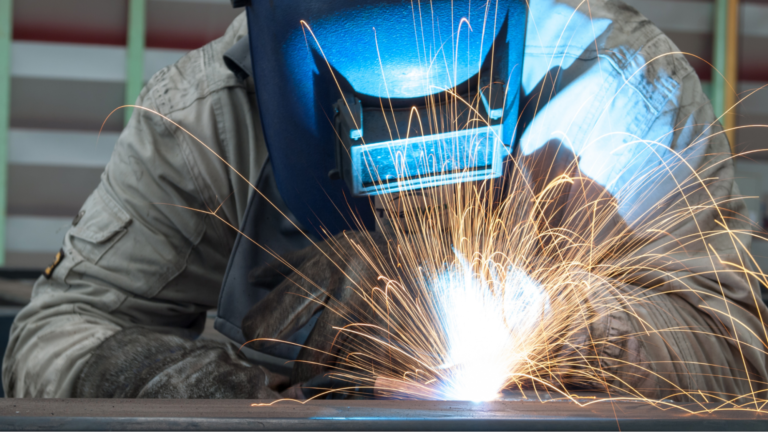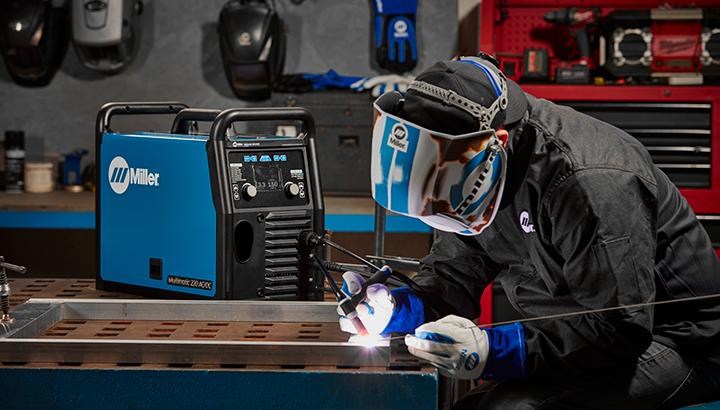To weld aluminum, you typically use a shielding gas mixture of argon or an argon-helium blend. Pure argon is the most common choice due to its clean, strong weld characteristics.
Welding aluminum requires an understanding of the material’s unique properties and the suitable gas for optimal results. The choice of shielding gas profoundly influences the quality of your weld. Aluminum’s high thermal conductivity necessitates the use of an inert gas, such as argon, during the welding process.
This gas prevents oxidation and creates a stable arc for cleaner, more precise welds. For some applications, an argon-helium mix can be used, especially when welding thicker aluminum pieces, as helium promotes deeper heat penetration. Proper selection and handling of the gas ensure the resulting weld is structurally sound and visually appealing, reflecting the skill of the welder and fulfilling the demands of the task at hand.

Credit: www.pasteel.com
Different Welding Gases
Discover the optimal gas for aluminum welding. The right choice makes a difference.
Aluminum welding requires specific gases. These gases affect quality and efficiency.
Argon
Argon is the go-to gas for aluminum welding. It creates stable arcs and clean results.
- Ideal for thin sheets and intricate shapes.
- Prevents contamination and oxidation.
- Compatible with GTAW (TIG) and GMAW (MIG).
| Purity | Flow rate | Use with |
|---|---|---|
| 99.999% | 20-30 CFH | TIG, MIG |
Helium
Helium offers deeper penetration. It’s ideal for thick aluminum.
- Increases welding speed on heavier materials.
- Improves heat input, beneficial for thicker sections.
- Mix with argon for enhanced quality.
- Clean the material.
- Adjust the flow rate.
- Test on scrap metal first.

Credit: www.millerwelds.com
Properties Of Argon
When welding aluminum, choosing the right shielding gas is crucial. Argon stands out with its unique characteristics. It makes welding smoother and cleaner. Let’s delve into the properties that make Argon the ideal choice for welding aluminum.
Inert Gas
Argon is an inert gas. This means it doesn’t react with other elements easily. Its inertness ensures that the aluminum won’t be contaminated during the welding process. This results in a stronger and cleaner weld which is just what welders need when working with aluminum.
High Density
The high density of Argon provides a consistent blanket over the weld pool. This helps to protect the molten aluminum. It also improves the quality of the weld by preventing oxidation and other defects.
Good Stability
With good stability, Argon offers a steady flow that helps maintain a clean arc. This stability is key for achieving precision in welding, especially for tasks that require a high level of accuracy and detail.
| Property | Benefit |
|---|---|
| Inertness | Prevents contamination |
| Density | Consistent protection |
| Stability | Precise welds |
- The gas shields the welding zone.
- It prevents unwanted chemical reactions.
- Argon ensures a clean work environment.
Understanding these properties helps you see why Argon is so important in welding. Its purifying effect, heavier shield over the welded area, and consistent welding quality make it indispensable.
Properties Of Helium
When welding aluminum, the choice of gas plays a crucial role. One popular option is helium. Its unique properties make it well-suited for this purpose. Let’s explore why helium stands out in the welding world.
Less Dense
Helium is much lighter than air. This makes it an ideal choice for creating a stable yet easily controllable welding environment. Its low density allows for better coverage over the weld area. It improves the welding process by making the gas shield more effective.
Higher Thermal Conductivity
- Helium conducts heat better than other gases.
- It transfers heat effectively across the aluminum surface.
- This leads to faster welding speeds and stronger welds.
Lower Ionization Potential
Helium has a lower ionization potential than other noble gases. This allows for easier start and maintenance of the arc. A smoother arc means better control and cleaner welds. It is especially helpful in creating high-quality aluminum welds.
Choosing The Right Gas For Aluminum Welding
Welding aluminum requires precise techniques and the right gas. This guide simplifies the choice for welders of all levels. Knowing the correct gas ensures strong welds on aluminum projects.
Application And Thickness
The purpose and size of your project guide the gas selection. Consider these factors:
- Thinner materials: Use a gas that flows smoothly and prevents burn-through.
- Heavier sections: Require a gas that offers deep penetration.
- Speed: For rapid welding, certain gases provide faster travel speeds.
Budget Considerations
Gas choices impact costs. Your project budget may dictate the gas type:
| Gas Type | Cost |
|---|---|
| Argon | Lower |
| Helium mixes | Higher |
Select a gas that balances cost-effectiveness with performance needs.
Desired Weld Quality
High-quality welding gas contributes to the overall success of the weld. Purity levels and the right gas mixture play key roles:
- Pure argon for a clean, spatter-free weld bead.
- Argon-helium mixtures for better heat input and weld quality on thicker material.
Choose a gas that elevates the aesthetic and strength of your welds.

Credit: esab.com
Frequently Asked Questions On What Gas Do You Use To Weld Aluminum
What Shielding Gas For Aluminum Welding?
Argon is the most common shielding gas used for welding aluminum. It provides a stable arc and cleaner welds. Mixing helium can increase penetration and weld speed.
Can You Weld Aluminum With Pure Argon Gas?
Yes, pure argon is often preferred for welding aluminum, especially for thin-gauge materials. It promotes good arc stability and lessens the chance of weld contamination.
Is A Mixed Gas Necessary For Aluminum Welding?
A mixture of argon and helium is sometimes used for aluminum welding. This enhances penetration on thicker materials. But for most applications, pure argon suffices.
How Does Helium Affect Aluminum Welding?
Adding helium to argon increases the heat input and weld pool fluidity. It allows for deeper penetration, especially useful for thicker aluminum workpieces.
Conclusion
Selecting the right gas for welding aluminum is crucial for a strong and clean weld. Argon is the top choice for its compatibility and effectiveness. Remember, your specific project requirements dictate the ideal gas mix. For expert welding results, prioritize purity and flow rates.
Mastering gas selection ensures impeccable aluminum welds every time.
